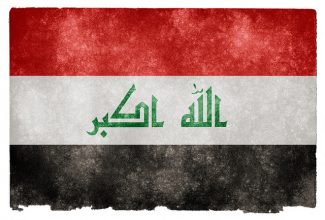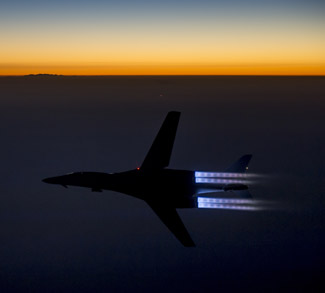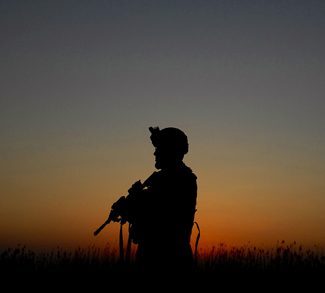While it’s expected that it will be the Kurds who separate from Iraq, the real beneficiaries from a break-up of the country would be the Shia. They’re the ones who control 80 percent of the country’s oil wealth, and they would prefer not to share it with hostile neighbors.
The invasion by the Islamic State into the western provinces of Iraq is only half of the war with Baghdad. The other half is the civil war that began when the Western tribes joined with Islamic State in an attempt to reestablish Sunni control over the central government and the wealth that three million barrels of oil per day can provide.
If the army of the Islamic State is defeated, the battalions of soldiers will disappear, but the rebel tribes and the hundreds of disgruntled former military officers from the Saddam Hussein regime will remain. They will still not have access to the halls of power or the riches of the oil fields. Instead, the large portion of the Sunni population depending upon government food baskets to survive will continue to depend upon Shia welfare. So far, neither Baghdad nor Washington has offered any program to deal with this situation, which leaves the problem festering to arise again.
Like the Sunnis in the Western provinces, the Kurds constitute twenty percent of the national population. Unlike the Sunnis, they have spent the last twenty years constructing the institutions of a modern state with health and medical services and a thirty thousand strong armed force.
They have made no secret of their intent to convert their autonomous status into an independent republic. All that is lacking for the formation of a Kurdish Republic is the revenue needed to fund a society in which half of the labor force is employed by the government; and the government depends upon Baghdad for the bulk of its revenue.
Over the objection of the central government, the Kurds have opened their territory to oil exploration by fifty foreign companies that range from Exxon to minor firms. Many of these companies include highly positioned former officers from the US armed forces and diplomatic service, many of whom served in Iraq.
Erbil has been expecting Baghdad to provide funds to finance the unauthorized agreements that will in time enable the Kurds to separate. Baghdad in February responded by cutting off the 17 percent of the national revenue that is specified under the constitution to go to Kurdistan.
Access to the world market for Kurdish oil via a new pipeline through Turkey is worsening the dispute between Erbil and Baghdad. Over the next few years, Kurdish oil exports are expected to rise from the current level of four hundred thousand to more than one million (bpd). At that point, the Kurds are likely to move to achieve their long-awaited independence; and the American executives in the exploration and other companies will be able to provide an influential lobby back in Washington for US support.
Baghdad has been distributing more than a third of national revenue to the Kurds and the western tribes, and nearly all this revenue comes from the export of three million bpd. 80 percent of Iraqi oil comes from the southern fields and is shipped through a Persian Gulf port.
Neither the Kurds nor the tribes have access to the world market to sell their oil, unless they pipe it through Shia Iraq or Turkey. Either they remain a part of Iraq and transfer the bulk of their revenue to Baghdad, or, as an independent Kurdistan, they pay a pipeline transit fee to Turkey or to the separate government in Baghdad.
Whether President Bush or Obama, the American objective has been to establish and maintain a united, secular, and democratic Iraq. Thousands of Americans and Iraqis died and hundreds of billions of dollars were spent to fulfill this policy.
The democratic part of the trinity renders the policy a delusion when the votes are counted. 60 percent of the population is Shia and they are clinging to the power that was denied to them for decades by the Sunni minority.
The Shia occupy 50 percent of the territory and control 80 percent of the oil reserves. If the Kurds declare independence from Baghdad or the Shia region separates, it will accomplish the same thing. Baghdad will have a budget surplus, because the western provinces and the three Kurdish provinces are a drain on national revenue.
Saddam Hussein, who was a Sunni, kept the ethic hostilities in check by imposing a secular rule through force of arms. The American occupation ended this. The occupation also made it possible for a nationwide process of ethnic cleansing to divide the country into three distinct mutually hostile ethnic groups.
The Shia are tied more closely with Iran than with their own national minorities. If the combined oil production between Iraq and Iran reaches its capacity of ten million barrels per day, they would break Saudi domination of the world oil supply.
In terms of the current threat, this wealth would make the Shia a formidable barrier against the advance of Islamic State, a group that has sworn to slaughter every Shia. Surviving the Sunni threat has become paramount among the Shia in Iraq and Iran, which is why there is no surprise that the new Minister of Petroleum Adel Abdul-Mehdi in the Al-Abadi government is a Shia. The changes in the post Al-Maliki administration are cosmetic with all of the same factions vying for power.
Seeing a large portion of Sunni troops flee or defect and the Kurds selling oil without authorization has fostered a sense of isolation and desperation among the Shia that leaves little inclination to compromise with their minority neighbors. Washington has sought to block any moves by the Kurds to separate, but there is little that Washington could do should the Shia seek to detach their region from Iraq. On the day that Baghdad declares its independence from the Sunni and the Kurds, Washington will discover that delusion made into policy will no longer work in Iraq or the rest of the Middle East.
Felix Imonti is an outside contributor to Geopoliticalmonitor.com, and he can be reached at [email protected].




